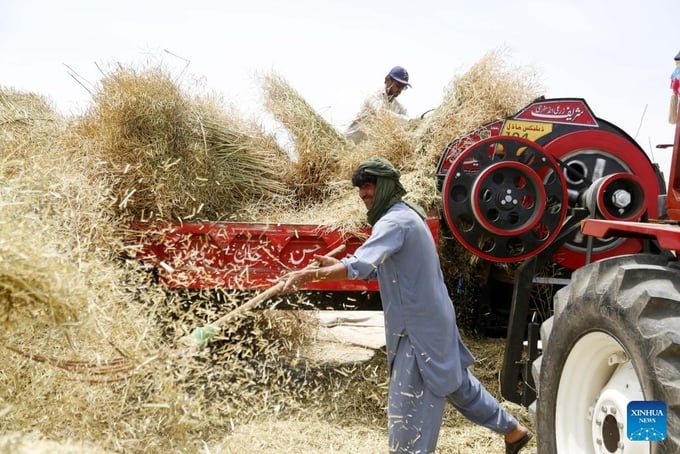May 30, 2025 | 06:00 GMT +7
May 30, 2025 | 06:00 GMT +7
Hotline: 0913.378.918
May 30, 2025 | 06:00 GMT +7
Hotline: 0913.378.918

Farmers harvest canola at a field in Pakistan's eastern Bhakkar district on April 17, 2024. In Pakistan's eastern Bhakkar district, farmers were left in awe as they witnessed the newly imported oilseed harvesters from China efficiently and briskly carrying out their tasks. Photo: Xinhua
"In Pakistan, we lose up to 40 percent of our crop due to our reliance on a single type of harvester used for harvesting all crops including wheat, oilseeds, and others, so seeing such a sophisticated machine specifically designed for oilseed harvesting is truly fascinating," Muhammad Masood, a local farmer told Xinhua.
While Pakistan is an agricultural-centric economy, it relies on imports for approximately 89 percent of its edible oil needs and spends 3.6 billion U.S. dollars annually to fulfill the demand of around 5 million tons.
Due to the high cost of imported edible oil, many villagers had to resort to cheaper but unhealthy alternatives such as mustard oil because of the unavailability of good quality oil seeds in the local market, he said.
However, with the introduction of the Chinese canola variety into the market under Pakistan-China cooperation, the local farmers finally got a choice, the farmer added.
Launched in 2013, the China-Pakistan Economic Corridor (CPEC) is a corridor linking the Gwadar Port in southwest Pakistan's Balochistan province with Kashgar in northwest China's Xinjiang Uygur Autonomous Region, which highlights energy, transport, and industrial cooperation in the first phase, while in the new phase expands to fields of agriculture and livelihood, among others.
In line with the CPEC's cooperation in agriculture, Chinese company Wuhan Qingfa Hesheng Seed Co. Ltd. and Pakistani company Evyol Group signed a memorandum of understanding in 2022 to help Pakistan become self-sufficient in edible oil through ample cultivation and efficient harvest of healthy canola oilseeds.
Talking to Xinhua, Ghazanfar Ali, head of marketing in Evyol Group, said that in the first phase, the Chinese company provided high-quality hybrid seed for cultivation, which not only increased per acre yield as compared to local oilseeds but also provided a healthy alternative to locals.
In the second phase, the company is working on transferring technology to Pakistan, under which the harvesters have been imported from China, paving the way for smart agriculture practices in the country, said Ali.
Subsequent plans for the third phase involve importing oil-extracting machines, which will enable local farmers to extract the oil themselves for domestic consumption and commercial use, he added.
Talking about the new machines, Zhou Xusheng, director of the international business department of Wuhan Qingfa Hesheng Seed company, told Xinhua that they have developed two kinds of harvesting equipment that align with local cultivation and use habits.
One of the equipment enables one-time harvesting, slashing harvest loss to eight to ten percent while the other offers a two-stage approach, which involves cutting the crop close to maturity and picking it up two to three days later, reducing loss to less than five percent, he added.
The technological advancement can boost yields by 20 to 30 percent, thereby enhancing farmers' incomes and accelerating widespread adoption, compatible with existing harvesters in Pakistan, Zhou said.
The harvesters will be further customized according to the requirements of locals, after feedback from local farmers and agriculture experts, following which the bulk import of the equipment will be made, Ali told Xinhua.
He underscored CPEC's role in elevating socio-economic standards by empowering farmers to embrace advanced technology."Through technology transfer, CPEC empowers local farmers to not only reduce labor and costs but also increase their earnings, enabling them to lead more prosperous lives, besides giving benefit to society as a whole," he said.
Talking about the significance of the technology transfer, Akmal Siddiq, technical advisor at the country's Ministry of National Food Security and Research said that during the oilseed harvest season, there is a shortage of labor in the agriculture sector as almost all winter crops are being harvested during the time.
The available labor is also not so skilled and when they harvest the crop by primitive measure, the overall productivity of the sector gets affected, he added.
"The adoption of Chinese agricultural technology represents a critical opportunity to modernize and transform the oilseed harvesting landscape in the country. Through effective technology transfer and adoption, the agricultural sector can overcome longstanding challenges, boost productivity, and contribute to the nation's food security and economic development," the official told Xinhua.
(Xinhua)

(VAN) Vikas Rambal has quietly built a $5 billion business empire in manufacturing, property and solar, and catapulted onto the Rich List.

(VAN) Available cropland now at less than five percent, according to latest geospatial assessment from FAO and UNOSAT.

(VAN) Alt Carbon has raised $12 million in a seed round as it plans to scale its carbon dioxide removal work in the South Asian nation.

(VAN) Attempts to bring down the price of the Japanese staple have had little effect amid a cost-of-living crisis.

(VAN) Fourth most important food crop in peril as Latin America and Caribbean suffer from slow-onset climate disaster.

(VAN) Shifting market dynamics and the noise around new legislation has propelled Trouw Nutrition’s research around early life nutrition in poultry. Today, it continues to be a key area of research.

(VAN) India is concerned about its food security and the livelihoods of its farmers if more US food imports are allowed.